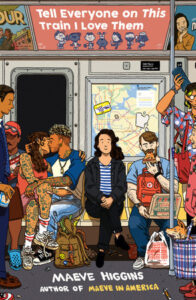
Maeve Higgins on How to Write with Humor
“No topic is off-limits for comedy.”
The following first appeared in Lit Hub’s The Craft of Writing newsletter—sign up here.
Comedy belongs in every piece of writing—humor is not a dodge or a distraction or a cheap trick, it’s an essential part of being alive, and as such, we must include it in the art we create. Like plants, no matter how much darkness we find ourselves in, we strain to find any tiny pinprick of light. In sadness, anxiety, and even violence, part of the human instinct will always be to laugh. Writers must include this vitality in their work.
It drives me crazy when people praise writing to high heaven for being “wrenching” or “harrowing” or worse, “unrelenting.” I’m all for heavy stories well told, but if that’s all they are, then, I’m sorry, but they are not wholly truthful. By denying the reader any levity, these stories omit something big and important.
Writing funny means threading jokes, curiosity, and connections throughout your work. It means coming up for air, knowing that those sips of oxygen are essential for clarity of thought and will allow us to go even deeper next time. You don’t need to go full clown to blend comedy into your writing—unless, of course, you want to! Jokes are the main thrust of satirists like Johnathan Swift and humorists like James Thurber and they are all the better for it.
If you’d like to play around with making your work funnier and lighter, I’d advise you to read it aloud to find the rhythm, either to yourself or to a trusted reader. Like any conversation, you will quickly hear where it sags; at those points, you need to cut lines or you need to lift them. When I say “lift them,” I mean to re-state them, the way Samantha Irby does in some of her essays, then really examine what is happening and explicitly name it. Nothing outlandish needs to happen; the absurdities within everyday situations and characters are often the funniest ones. Focus on the smallest details—the mutters, the eyebrows, the contradictions—and the reader will recognize them and get the joke.
No topic is off-limits for comedy. Remember how irresistible it can sometimes be to giggle at a funeral. In My Sister, The Serial Killer, Oyinkan Braithwaite makes the reader laugh along at the story of a sociopathic murderer and her well-meaning, but complicit, sibling. She does this by making it a screwball comedy full of set pieces worthy of a Will Ferrell movie.
Comedy belongs everywhere: to surprise, subvert, and snap us back into the conversation when our minds have shut down because they are tired or in pain. Yet, large parts of the literary world have decided that the serious modes are the only intelligent and worthy ones. That is elitist and self-important; also, it’s unfair. Writing heavy is the more obvious choice than writing light, and, in my opinion, it’s less skillful. Writing funny is difficult both emotionally and technically, but when it’s done right, it reads easy. And what a service that is! Reading funny is a pleasure and a relief, striking notes that otherwise get missed, helping us to hear the entire messy symphony of human experience.
__________________________________

Tell Everyone on This Train I Love Them by Maeve Higgins is available via Penguin Books.
Maeve Higgins
Maeve Higgins is a contributing writer for The New York Times and the host of the hit podcast Maeve in America: Immigration IRL. She is a comedian who has performed all over the world, including in her native Ireland, Edinburgh, Melbourne, and Erbil. Now based in New York, she cohosts Neil deGrasse Tyson’s StarTalk, both the podcast and the TV show on National Geographic, and has also appeared on Comedy Central’s Inside Amy Schumer and on WNYC’s 2 Dope Queens.



















